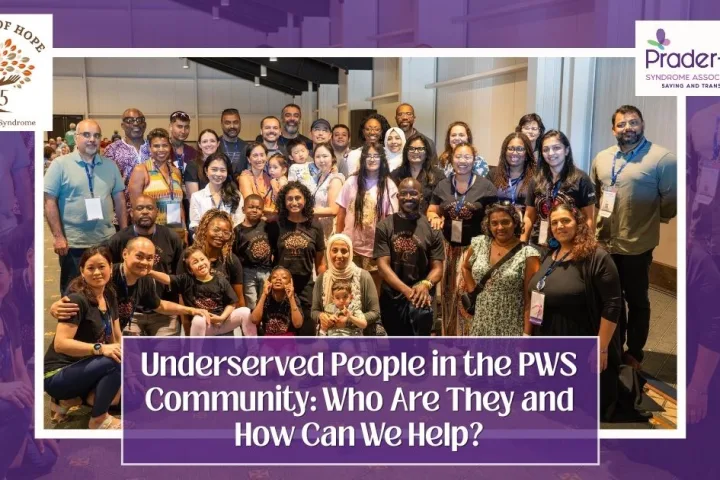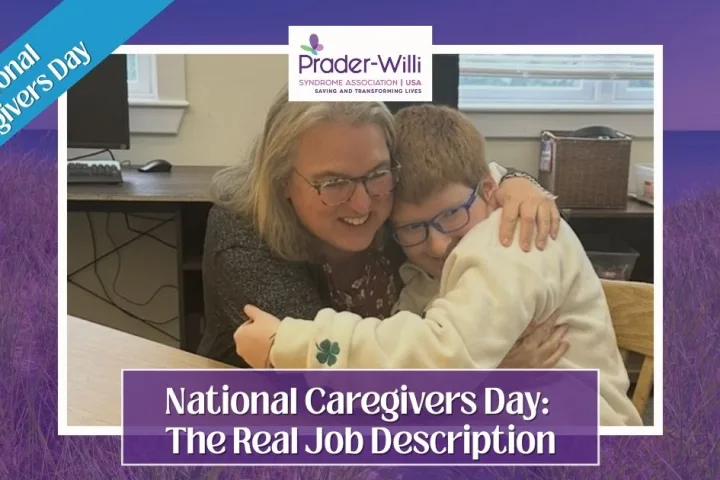Contributed by Denise Servais, M. Ed, CCC-SLP
One way to make a lasting impact and to honor a loved one with Prader-Willi syndrome is by remembering Prader-Willi Syndrome Association | USA in your will or estate plan. Creating a gift in your will or estate, at any level, is a special way to show your support for the important work that PWSA | USA does and can be done easily by adding language to your existing will, or simply naming PWSA | USA as a beneficiary when you create your will. This generous act serves as an important legacy for you and your family and can help to ensure support for our mission for generations to come.
One such donor recently named PWSA | USA in her will with a sizable gift. This donor had learned about the syndrome and the valuable work that the organization was doing through her connection with former Board member Steve Leightman. After consulting with her financial advisor and attorney, this individual revised her will and included PWSA | USA in her estate plan. She learned that Steve has a granddaughter with PWS, and felt at peace knowing that her generous contribution will help fund programs such as our new Intensive Support Services and School Success Toolkits. Her gift will also enhance programs in the areas of Family Support, Advocacy, and Research for Steve’s granddaughter and so many others nationwide.
We recently learned about another generous family who has made plans for a legacy gift upon the sunsetting of a Special Needs Trust for their son living with PWS. Due to the support they have received from PWSA | USA over the past two decades, they have arranged for PWSA | USA to receive a lump sum donation that will come to us many, many years from now. It will serve as a gift of gratitude in honor of their PWS journey.
We are very grateful to all our of donors who are essential in helping us make a difference in the lives of those with Prader-Willi syndrome and their families today and well into the future.
If you would like to learn more on how to include PWSA | USA in your will or estate plan, please contact Melanie McDonald at 941-487-6742 or email at mmcdonald@pwsausa.org.
Share this!





 Perry A. Zirkel has written more than 1,500 publications on various aspects of school law, with an emphasis on legal issues in special education. He writes a regular column for NAESP’s Principal magazine and NASP’s Communiqué newsletter, and he did so previously for Phi Delta Kappan and Teaching Exceptional Children.
Perry A. Zirkel has written more than 1,500 publications on various aspects of school law, with an emphasis on legal issues in special education. He writes a regular column for NAESP’s Principal magazine and NASP’s Communiqué newsletter, and he did so previously for Phi Delta Kappan and Teaching Exceptional Children. Jennifer Bolander has been serving as a Special Education Specialist for PWSA (USA) since October of 2015. She is a graduate of John Carroll University and lives in Ohio with her husband Brad and daughters Kate (17), and Sophia (13) who was born with PWS.
Jennifer Bolander has been serving as a Special Education Specialist for PWSA (USA) since October of 2015. She is a graduate of John Carroll University and lives in Ohio with her husband Brad and daughters Kate (17), and Sophia (13) who was born with PWS. Dr. Amy McTighe is the PWS Program Manager and Inpatient Teacher at the Center for Prader-Willi Syndrome at the Children’s Institute of Pittsburgh. She graduated from Duquesne University receiving her Bachelor’s and Master’s degree in Education with a focus on elementary education, special education, and language arts.
Dr. Amy McTighe is the PWS Program Manager and Inpatient Teacher at the Center for Prader-Willi Syndrome at the Children’s Institute of Pittsburgh. She graduated from Duquesne University receiving her Bachelor’s and Master’s degree in Education with a focus on elementary education, special education, and language arts. Evan has worked with the Prader-Willi Syndrome Association (USA) since 2007 primarily as a Crisis Intervention and Family Support Counselor. Evans works with parents and schools to foster strong collaborative relationships and appropriate educational environments for students with PWS.
Evan has worked with the Prader-Willi Syndrome Association (USA) since 2007 primarily as a Crisis Intervention and Family Support Counselor. Evans works with parents and schools to foster strong collaborative relationships and appropriate educational environments for students with PWS. Staci Zimmerman works for Prader-Willi Syndrome Association of Colorado as an Individualized Education Program (IEP) consultant. Staci collaborates with the PWS multi-disciplinary clinic at the Children’s Hospital in Denver supporting families and school districts around the United States with their child’s Individual Educational Plan.
Staci Zimmerman works for Prader-Willi Syndrome Association of Colorado as an Individualized Education Program (IEP) consultant. Staci collaborates with the PWS multi-disciplinary clinic at the Children’s Hospital in Denver supporting families and school districts around the United States with their child’s Individual Educational Plan. Founded in 2001, SDLC is a non-profit legal services organization dedicated to protecting and advancing the legal rights of people with disabilities throughout the South. It partners with the Southern Poverty Law Center, Protection and Advocacy (P&A) programs, Legal Services Corporations (LSC) and disability organizations on major, systemic disability rights issues involving the Individuals with Disabilities Education Act (IDEA), Americans with Disabilities Act (ADA), and the federal Medicaid Act. Recently in November 2014, Jim retired.
Founded in 2001, SDLC is a non-profit legal services organization dedicated to protecting and advancing the legal rights of people with disabilities throughout the South. It partners with the Southern Poverty Law Center, Protection and Advocacy (P&A) programs, Legal Services Corporations (LSC) and disability organizations on major, systemic disability rights issues involving the Individuals with Disabilities Education Act (IDEA), Americans with Disabilities Act (ADA), and the federal Medicaid Act. Recently in November 2014, Jim retired.